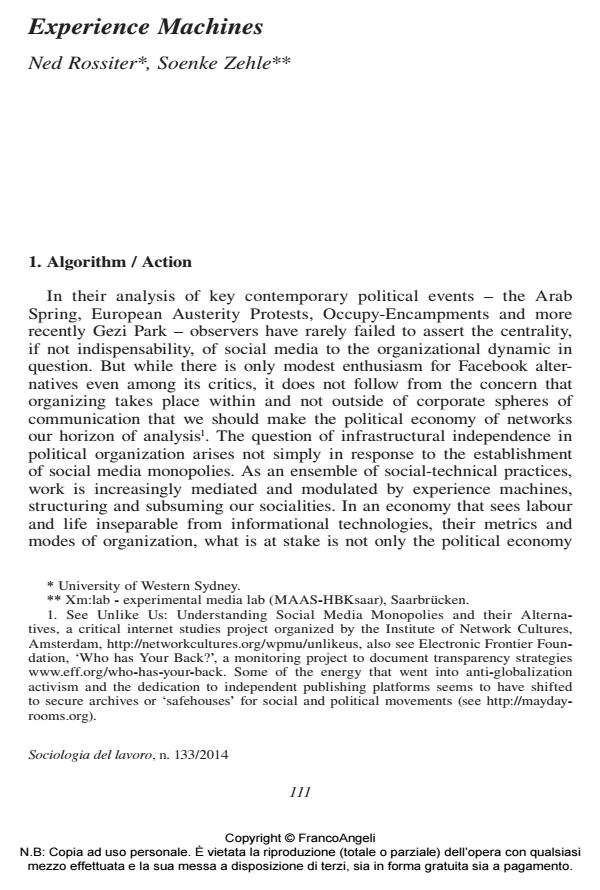Experience Machines
Titolo Rivista SOCIOLOGIA DEL LAVORO
Autori/Curatori Ned Rossiter, Soenke Zehle
Anno di pubblicazione 2014 Fascicolo 2014/133
Lingua Inglese Numero pagine 22 P. 111-132 Dimensione file 663 KB
DOI 10.3280/SL2014-133008
Il DOI è il codice a barre della proprietà intellettuale: per saperne di più
clicca qui
Qui sotto puoi vedere in anteprima la prima pagina di questo articolo.
Se questo articolo ti interessa, lo puoi acquistare (e scaricare in formato pdf) seguendo le facili indicazioni per acquistare il download credit. Acquista Download Credits per scaricare questo Articolo in formato PDF

FrancoAngeli è membro della Publishers International Linking Association, Inc (PILA), associazione indipendente e non profit per facilitare (attraverso i servizi tecnologici implementati da CrossRef.org) l’accesso degli studiosi ai contenuti digitali nelle pubblicazioni professionali e scientifiche.
In un’economia che vede il lavoro e la vita inseparabili dalle tecnologie informatiche, dalle loro metriche e dalle loro modalità di organizzazione, ciò che entra direttamente in gioco non è solo l’economia politica del networking online, ma la costituzione stessa della soggettività politica - l’autonomia degli affetti. Allo stesso modo in cui i nuovi concatenamenti algoritmici generano in tempo reale dati sulla base della nostra pratica comunicativa, l’organizzazione si confronta con una nuova risorsa che è sia sociale che tecnologica. Dobbiamo sviluppare i nostri dispositivi concettuali sul terreno degli algoritmi, che strutturano e al contempo sostengono le nostre pratiche comunicative. Modulazione, influenza, mediazione, costituzione, composizione, produzione di soggettività: sono questi i processi di design dell’esperienza che tentano di catturare ciò che l’esperienza è diventata. Prendendo l’esperienza dei network come punto di partenza per costruire una nuova visione della comunicazione in rete, basandola sul parallelismo tra l’agire umano e quello della macchinica e sui tentativi delle nuove forme di governance di negare l’inventiva che proviene dalla socialità relazionale, senza essere pessimisti, tentiamo di definire aspetti della relazione comunicativa, tra cui ad esempio l’esperienza. E nel momento in cui ci impegniamo in un lavoro di traduzione culturale - dal rapportarsi, per esempio, con i codici che guidano l’algoritmizzazione delle nostre pratiche comunicative, ai codici sociali che emergono attraverso le nuove cartografie della politica - possiamo trovarci su di un terreno diverso, pronti a reinventare le nostre relazioni con la politica.
Parole chiave:Algoritmo, governance, networking, politica, pratiche comunicative, tecnologia
Ned Rossiter, Soenke Zehle, Experience Machines in "SOCIOLOGIA DEL LAVORO " 133/2014, pp 111-132, DOI: 10.3280/SL2014-133008